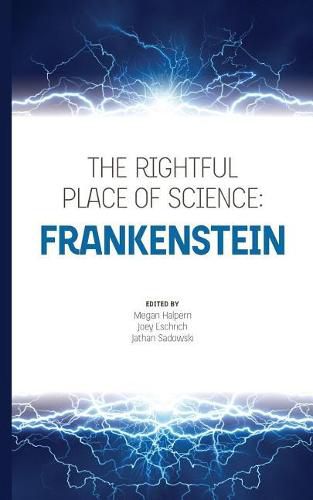Readings Newsletter
Become a Readings Member to make your shopping experience even easier.
Sign in or sign up for free!
You’re not far away from qualifying for FREE standard shipping within Australia
You’ve qualified for FREE standard shipping within Australia
The cart is loading…






Two hundred years after its publication, Mary Shelley’s Frankenstein continues to speak to modern concerns about science, technology, and society. The story of Victor Frankenstein and his creature has become a cultural touchstone through myriad theatrical renditions, movies, and other adaptations and allusions. But Shelley’s original tale is far richer and more relevant to contemporary issues than the common interpretation of Frankenstein as a warning against scientific hubris.The authors of the essays in The Rightful Place of Science: Frankenstein examine the roots and origins of Shelley’s tragically flawed scientist and his benighted creature. They consider Frankenstein as a parable of creativity and responsibility that can help us better understand our current creative dilemmas. And they show how Shelley’s text foreshadows future technological innovations, and the challenges we anticipate from emerging fields such as synthetic biology and artificial intelligence. The bicentennial of this story of a scientist who failed to care for his creation provides an opportunity to explore creativity and responsibility across literary, scientific, social, and cultural dimensions.
$9.00 standard shipping within Australia
FREE standard shipping within Australia for orders over $100.00
Express & International shipping calculated at checkout
Two hundred years after its publication, Mary Shelley’s Frankenstein continues to speak to modern concerns about science, technology, and society. The story of Victor Frankenstein and his creature has become a cultural touchstone through myriad theatrical renditions, movies, and other adaptations and allusions. But Shelley’s original tale is far richer and more relevant to contemporary issues than the common interpretation of Frankenstein as a warning against scientific hubris.The authors of the essays in The Rightful Place of Science: Frankenstein examine the roots and origins of Shelley’s tragically flawed scientist and his benighted creature. They consider Frankenstein as a parable of creativity and responsibility that can help us better understand our current creative dilemmas. And they show how Shelley’s text foreshadows future technological innovations, and the challenges we anticipate from emerging fields such as synthetic biology and artificial intelligence. The bicentennial of this story of a scientist who failed to care for his creation provides an opportunity to explore creativity and responsibility across literary, scientific, social, and cultural dimensions.